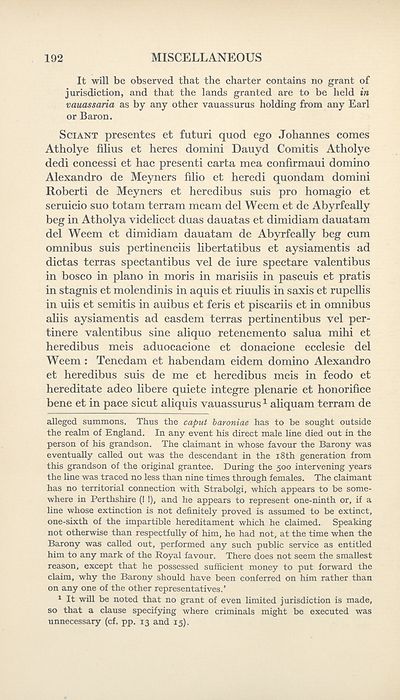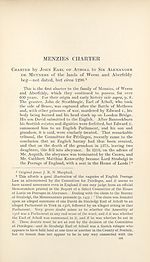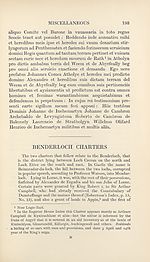Series 3 > Highland papers
(219) Page 192
Download files
Complete book:
Individual page:
Thumbnail gallery: Grid view | List view

192
MISCELLANEOUS
It will be observed that the charter contains no grant of
jurisdiction, and that the lands granted are to be held in
vauassaria as by any other vauassurus holding from any Earl
or Baron.
Sciant presentes et futuri quod ego Johannes comes
Atholye filius et heres domini Dauyd Comitis Atholye
dedi concessi et hac present! carta mea confirmaui domino
Alexandro de Meyners filio et heredi quondam domini
Robert! de Meyners et heredibus suis pro homagio et
seruicio suo totam terram meam del Weem et de Abyrfeally
beg in Atholya videlicet duas dauatas et dimidiam dauatam
del Weem et dimidiam dauatam de Abyrfeally beg cum
omnibus suis pertinenciis libertatibus et aysiamentis ad
dictas terras spectantibus vel de iure spectare valentibus
in bosco in piano in moris in marisiis in pascuis et pratis
in stagnis et molendinis in aquis et riuulis in saxis et rupellis
in uiis et semitis in auibus et feris et piscariis et in omnibus
aliis aysiamentis ad easdem terras pertinentibus vel per-
tinere valentibus sine aliquo retenemento salua mihi et
heredibus meis aduocacione et donacione ecclesie del
Weem : Tenedam et habendam eidem domino Alexandro
et heredibus suis de me et heredibus meis in feodo et
hereditate adeo libere quiete integre plenarie et honorifice
bene et in pace sicut aliquis vauassurus1 aliquam terram de
alleged summons. Thus the caput baroniae has to be sought outside
the realm of England. In any event his direct male line died out in the
person of his grandson. The claimant in whose favour the Barony was
eventually called out was the descendant in the 18th generation from
this grandson of the original grantee. During the 500 intervening years
the line was traced no less than nine times through females. The claimant
has no territorial connection with Strabolgi, which appears to be some¬
where in Perthshire (!!), and he appears to represent one-ninth or, if a
line whose extinction is not definitely proved is assumed to be extinct,
one-sixth of the impartible hereditament which he claimed. Speaking
not otherwise than respectfully of him, he had not, at the time when the
Barony was called out, performed any such public service as entitled
him to any mark of the Royal favour. There does not seem the smallest
reason, except that he possessed sufficient money to put forward the
claim, why the Barony should have been conferred on him rather than
on any one of the other representatives.’
1 It will be noted that no grant of even limited jurisdiction is made,
so that a clause specifying where criminals might be executed was
unnecessary (cf. pp. 13 and 15).
MISCELLANEOUS
It will be observed that the charter contains no grant of
jurisdiction, and that the lands granted are to be held in
vauassaria as by any other vauassurus holding from any Earl
or Baron.
Sciant presentes et futuri quod ego Johannes comes
Atholye filius et heres domini Dauyd Comitis Atholye
dedi concessi et hac present! carta mea confirmaui domino
Alexandro de Meyners filio et heredi quondam domini
Robert! de Meyners et heredibus suis pro homagio et
seruicio suo totam terram meam del Weem et de Abyrfeally
beg in Atholya videlicet duas dauatas et dimidiam dauatam
del Weem et dimidiam dauatam de Abyrfeally beg cum
omnibus suis pertinenciis libertatibus et aysiamentis ad
dictas terras spectantibus vel de iure spectare valentibus
in bosco in piano in moris in marisiis in pascuis et pratis
in stagnis et molendinis in aquis et riuulis in saxis et rupellis
in uiis et semitis in auibus et feris et piscariis et in omnibus
aliis aysiamentis ad easdem terras pertinentibus vel per-
tinere valentibus sine aliquo retenemento salua mihi et
heredibus meis aduocacione et donacione ecclesie del
Weem : Tenedam et habendam eidem domino Alexandro
et heredibus suis de me et heredibus meis in feodo et
hereditate adeo libere quiete integre plenarie et honorifice
bene et in pace sicut aliquis vauassurus1 aliquam terram de
alleged summons. Thus the caput baroniae has to be sought outside
the realm of England. In any event his direct male line died out in the
person of his grandson. The claimant in whose favour the Barony was
eventually called out was the descendant in the 18th generation from
this grandson of the original grantee. During the 500 intervening years
the line was traced no less than nine times through females. The claimant
has no territorial connection with Strabolgi, which appears to be some¬
where in Perthshire (!!), and he appears to represent one-ninth or, if a
line whose extinction is not definitely proved is assumed to be extinct,
one-sixth of the impartible hereditament which he claimed. Speaking
not otherwise than respectfully of him, he had not, at the time when the
Barony was called out, performed any such public service as entitled
him to any mark of the Royal favour. There does not seem the smallest
reason, except that he possessed sufficient money to put forward the
claim, why the Barony should have been conferred on him rather than
on any one of the other representatives.’
1 It will be noted that no grant of even limited jurisdiction is made,
so that a clause specifying where criminals might be executed was
unnecessary (cf. pp. 13 and 15).
Set display mode to:
![]() Universal Viewer |
Universal Viewer | ![]() Mirador |
Large image | Transcription
Mirador |
Large image | Transcription
Images and transcriptions on this page, including medium image downloads, may be used under the Creative Commons Attribution 4.0 International Licence unless otherwise stated. ![]()
| Scottish History Society volumes > Series 3 > Highland papers > (219) Page 192 |
|---|
| Permanent URL | https://digital.nls.uk/127232409 |
|---|
| Attribution and copyright: |
|
|---|
| Description | Over 180 volumes, published by the Scottish History Society, containing original sources on Scotland's history and people. With a wide range of subjects, the books collectively cover all periods from the 12th to 20th centuries, and reflect changing trends in Scottish history. Sources are accompanied by scholarly interpretation, references and bibliographies. Volumes are usually published annually, and more digitised volumes will be added as they become available. |
|---|


